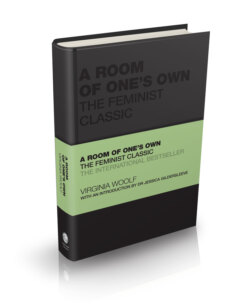Читать книгу A Room of One's Own - Virginia Woolf - Страница 14
CRITICISMS
ОглавлениеA Room of One's Own has been critical for the feminist movement, for studies of women's literary history and of modernism. But it is not without issues.
Part of the purpose of the essay is to encourage women to make their living through writing but, as we have said, Woolf herself was in a privileged position. She admits her good fortune in inheriting £500 a year from an aunt, such that her purse now ‘breed[s] ten‐shilling notes automatically.’ With such circumstances, it seems easy for her to advise against ‘doing work that one did not wish to do, and to do it like a slave, flattering and fawning.’ Yet it should not take away from her wider point, expressed at several points in the essay, that women through history have never been in control of money. Instead of earning through careers (which were forbidden to women), or being able to invest money for good ends (such as endowing university colleges), women – even if they were comparatively well‐off, had been reduced to ‘grateful recipients’. Woolf's windfall comes the same year that an act was passed for women to vote, but she describes her new fixed income as ‘infinitely more important.’ She could spend more time with her artistic friends in what would become the Bloomsbury set, but it also enabled her to stop seeking poorly paid journalism or teaching work. She could raise her literary sights and become a voice for women.
Critics have noted contradiction, bias, and snobbery throughout A Room of One's Own. Her critique of the ‘awkward break’ in Charlotte Bronte's Jane Eyre (1847), in which the narration is interrupted by an angry monologue on women's oppression, seems to show little tolerance for emotion, so often coded as hysteria, in political discussion. And Madelyn Detloff (2012) points to an attitude of disgust towards the working class in Woolf's observation that ‘genius like Shakespeare's is not born among laboring, uneducated, servile people … It is not born today among the working classes.’
It could be said that Woolf's snobbishness is a function of her expectations about art and her own ambitions, rather than a failure to account for feminism's intersections, as Anne E. Fernald (2006) suggests. Still, Woolf's ambition, she adds, does appear to emphasise individualism at the expense of values of communal feminism.
Other critics see these contradictions as necessary to Woolf's argument. Angeliki Spiropoulou (2012) contends that she uses these conflicts as not only a symptom of modernity, which ‘fosters antithetical thoughts, extreme sensations and ambivalent emotions,’ but more precisely ‘a means of pointing to an injustice that needs to be critiqued and corrected.’ Indeed, Kathleen Wall (1999) argues that the essay's argumentative structure ‘allows her to pursue truth while affirming its problematic status.’
Paradoxically, Woolf's adoption of multiple perspectives and possibilities is related to her idea of ‘unity’ of mind:
‘What does one mean by “the unity of the mind”? I pondered, for clearly the mind has so great a power of concentrating at any point at any moment that it seems to have no single state of being. It can separate itself from the people in the street, for example, and think of itself as apart from them, at an upper window looking down on them. Or it can think with other people spontaneously, as, for instance, in a crowd waiting for some piece of news read out … Clearly the mind is always altering its focus, and bringing the world into different perspectives.’
It is only when the mind cooperates or fuses with the characteristics of the opposite sex, however, that it finds a ‘natural’ ease. ‘[A] great mind is androgynous,’ Woolf writes. ‘It is when this fusion takes place that the mind is fully fertilised and uses all its faculties.’
It is not only the ‘great mind’ of the writer that is important here, then, but the great mind of the reader, who must come to hold these contradictions in balance if they are to understand the advantages as well as the problems of Woolf's position on women.
